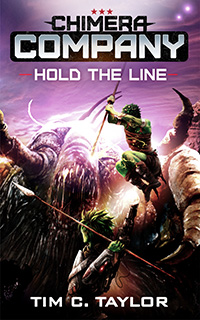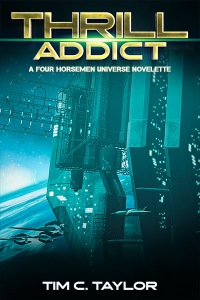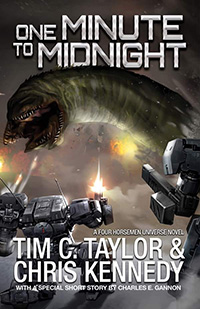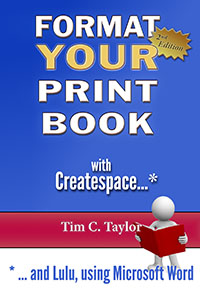For a bit of lunchtime fun, I tried journalism in response to today’s press release from the Publishers’ Association, which has been widely reported in the UK press, emphasizing the story that eBook sales are in a ‘slump’.
Here’s my first ever attempt at journalism:
The Publishers Association today reported a slump in eBook fiction sales across their members after a change in strategy in which they increased eBook prices in an attempt to drive consumers back to printed books.
Commenting on the 16% sales drop, Stephen Lotinga, chief executive of the Publishers Association, said, “There is generally a sense that people are now getting screen tiredness from so many devices being used… [Printed] books provide an opportunity to step away from that.”
However, the change in pricing strategy, and the relentless traditional publishing press briefings over the past year on the alleged consumer shift back to print, is interpreted by others as a tacit admission that the members of the Publishers Association, who dominated UK publishing until only a few years ago, have now lost control of digital book publishing, where new entrants thrive in the form of micro-publishers, self-publishers and Amazon’s own imprints.
With the Publishers Association now representing only a tiny fraction of UK publishers (although most of the largest ones are members), and the dominant eBook retailer, Amazon, refusing to disclose sales figures, it is impossible to be sure of the true state of digital book publishing in the UK. Perhaps most telling is the line in Amazon’s recently released annual report in which the retail giant stated that Kindle eBook sales rose last year, as they have every year since the Kindle’s launch. Subscription services are also booming, such as Amazon’s Kindle Unlimited service which reports 3 ½ billion page reads per month.
I actually found this very hard because to my mind journalists need to check facts and attempt a balanced point of view. In this case, the key fact (are eBook sales up or down) is impossible to know for sure. What is certain is that the Publishers Association does not represent the publishing industry, and neither do their statistics, but that doesn’t stop them issuing self-serving spin (which is understandable, for that is their purpose).
How could I phrase my report and stay neutral? Every phrasing I considered added nuance and tacit spin. Neutrality and balance is not easy! I came away with enhanced respect for genuine journalists.
However, genuine journalists seem to be a rarity in this era of ever-faker news.
For an example of a once-great newspaper that often seems to have abandoned journalism altogether, compare my attempt with the equivalent in the Guardian. Bonus points if you spot the Guardian’s spelling mistake. A million extra points if you can spot where the Guardian writer attempts to qualify the accuracy of the data reported by the Publisher’s Association (ie it isn’t at all meaningful when used to consider the industry), or to provide a balanced point of view (by considering the vast legion of publishers who are not in this trade body).













Pingback: A new trend for publishing retail? | Tim C. Taylor
You sure that’s your first attempt at journalism? Seemed pretty good to me, although I can’t say I’m in favour of the term “…ever-faker news…” – but I guess we may all have to accept Trumpisms, grammatically solid or not! (Curiously I ran this sentence through MS Word – UK edition – and while it suggested the ‘pretty good’ should be improved, it was quite happy with ‘ever-faker’. 😊)
I heard of the slump in e-book sales this morning on BBC TV. It doesn’t actually affect me personally as a 16% slump of nothing leaves me no worse off. I can’t say I’m surprised, though. Could this be the beginning to emerge, where people are becoming more wary of the transience of electronic information, the fact it is so easy to ‘adjust’ or manipulate without leaving too many clues as to what’s been going on.
Books, on the other hand – real, hard, solid books – always feel so durable, so much more dependable. After all, what do you need to read a book? Eyes, light and understanding. A book’s battery doesn’t flatline just as you reach the penultimate page (although I’ll admit the candle might just snuff-out at an inappropriate moment). But it’s the feel of a book, the solidness of it, the substantiality, the fact it is in your hand. You bought it, it belongs to you. You can defend it, wave it in the air with cries of ‘long live Mao’ (or whatever), or rip it to shreds because the author’s words and ideas are so anathema they set your blood boiling.
Sure, books will perish all too easily in fires and floods and what-not. Sure, you can smash an e-book when it has set your teeth on edge (and well-done to any author who manages to elicit such feelings in their readership!) And I’d never argue against the ease of some activities, such as searching, which are so much easier than leafing through page after page – although there are alternative thoughts to that, too.
But switch off an e-book, put it on the shelf and it just… sits there, lifeless and cold. The device (Kindle or any other) doesn’t give any clue about the owner, the reader. It may have hundreds of titles stored within its universe of electrons but you’d never know. How long is it since the e-book was last powered-up? Christmas? A couple of years? Ever?
A real book on the same shelf has a jacket of some description. It promotes its presence with a title, maybe a graphic. Visit someone’s house who loves books and take a look at their bookshelf, and you can instantly see which titles have been visited the most. They’re the ones that are a bit tatty, dog-eared, spines beginning to split from so much well-loved use.
And, finally there’s the smell. There’s nothing quite as intoxicating (to inveterate bibliophiles) as the musty, not-quite-damp tang you find in the air of a dingy bookshop (or even in the school library, as my mind recalls). Every book contributes to it, right from the start. It’s all to do with chemical reactions, of course, but I don’t actually care about why it happens; I just enjoy that it does!
SO, having hijacked your original piece, Tim, I hope you’ll forgive my rant. I did like what you wrote and I think you should now get a job as a top book reviewer for some distinguished periodical and end-up retiring in comfort in the Seychelles (or some equally exotic location!)
Thanks Nigel. Always good to hear from you. Funnily enough, I agree with your love of the musty. In the rush the media and some commentators have to declare the winner of the eBooks vs. print books bout, I think a third possibility is often ignored: that print and eBook sales are *both* rising. In fact, I think this is exactly what is happening. In the area of US & UK science fiction, where I put most of my attention, I often hear anecdotal evidence of voracious readers who were not previously readers of fiction, or readers who had drifted away from science fiction decades ago. Certainly the audience for science fiction books seems to have expanded at a phenomenal pace, and if this is mostly explained by attracting people into reading (rather than attracting people who were already readers but read something else) then this is a tremendously positive development.
Can’t disagree with you, old chap! 🙂